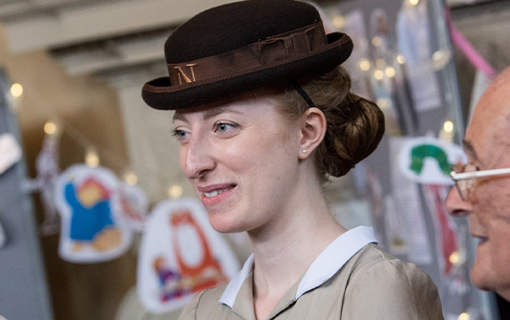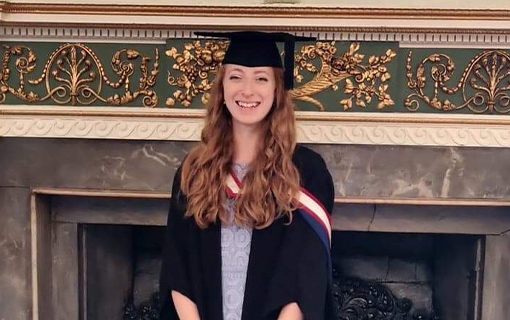Nannying during lockdown: Norlander Marianne's story
21 September 2020

In this series, Norlanders and Newly Qualified Nannies (NQNs) share their different experiences of nannying during lockdown.
Norlander Marianne (Set 39) nannied throughout lockdown. She became a fully qualified Norlander in 2019 and lives and works in Bristol. She is currently a daily nanny looking after a five-year-old boy and a 13-month-old girl and has been in this position for one year. Marianne also volunteers as a childcare support practitioner for the Twins Trust in her spare time and has recently become involved in campaigning for the regulation of nannies.
“During the coronavirus pandemic, it has often felt like the world is changing unpredictably and unrecognisably. However, it is my job as a nanny to ensure my charges have a safe and stable environment to thrive in. At times during lockdown, this felt like an impossible task. Whilst my job description didn’t change, I suddenly found my responsibilities increased as schools were shut, and both children were at home. With no activities, play areas or groups to vary our days, I quickly realised that we needed a new routine in which to thrive.

“This has highlighted the importance of recognition and regulation for nannies to increase our professional status and show that we are an important and valid choice of childcare.”
A typical lockdown day would begin at 7.30am with breakfast and some free play. We would then get ready for the day and I would settle the baby for her first nap at 8.30am. Whilst she slept, we got started with homeschooling. My eldest charge was lucky enough to have fantastic input and resources from his school, so we often had fun activities or challenges to complete. After this, we would set off on our one walk of the day. As we weren’t allowed to drive to our favourite walking spots, we took the opportunity to teach the eldest child how to ride a bike. This was a great project which increased his self-esteem and confidence, but also meant we could venture further on our walks. Our record was a four-mile circuit to the suspension bridge and back in time for lunch. During these walks we would often complete a tally chart of how many different trees, shapes or vehicles we could find, incorporating more learning into our morning.
After lunch, it was time for the baby’s second nap and some independent play time for the eldest. This was such an important part of the day when everyone would have some time alone to recharge, meaning we were all in better spirits when we reconnected at 2.30pm. We would then finish any homeschooling tasks before enjoying some imaginative play. This could involve making rockets in the garden out of boxes, creating an obstacle course or experimenting with ‘potions’. When it comes to planning activities, I follow the lead of my charges’ imagination and provide the resources and support for them to fulfil their fantasies. Dinner, bath and bedtime were kept constant throughout to create predictability. We found that sleep habits wobbled throughout lockdown as the children weren’t getting as much exercise and stimulation as they would usually, therefore it was important to keep to an early bedtime so Mum could get some rest before the variable nights.
For me, the hardest part of lockdown was explaining to my eldest charge why he faced so many restrictions on his daily life. We did lots of role play, answering questions honestly and practising so that we knew and understood the new rules. My charge would often pretend to be the Prime Minister and I would be the civil servant or media asking difficult questions and probing for information. This really cemented his understanding of the situation, as he felt he was in control and thought of his own solutions to the pandemic. However, it was difficult to hear his frustrations of wanting to see friends and family, or even to go to the park! I would empathise and share what I was missing too. We would then plan our perfect day out and fantasise about visiting the science museum and riding the underground. This helped to validate his feelings and instil a sense of hope that lockdown would lift one day.

“We have proven to be invaluable to our employers during this period, as other childcare options were shut, and deserve recognition for our hard work.”
Another part of lockdown that I found difficult was supporting families experiencing hardship. Usually, I would be able to visit families and offer guidance and reassurance face to face as a Twins Trust volunteer. It was quite a change to swap to calls and emails for such personal conversations. However, I feel very privileged to have helped families through such an unusual and challenging time. Going forward, I would love to support more families and share my expertise, as my confidence with different forms of communication has grown.
Overall, I found lockdown to be challenging but manageable as I have a close relationship with my employers and charges and as a live-out nanny I had my own free time. However, some of my peers experienced furlough, unemployment or spent lockdown living with their employers without the opportunity to see family and friends. I feel that the Government widely ignored nannies and took a long time to release any guidance. It was subsequently confirmed that nannies can work during lockdown and they were explicitly referred to in the UK government’s Recovery Strategy. This has highlighted the importance of recognition and regulation for nannies to increase our professional status and show that we are an important and valid choice of childcare. We have proven to be invaluable to our employers during this period, as other childcare options were shut, and deserve recognition for our hard work.



